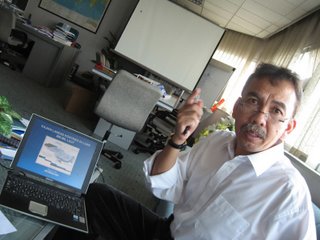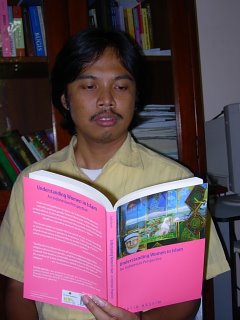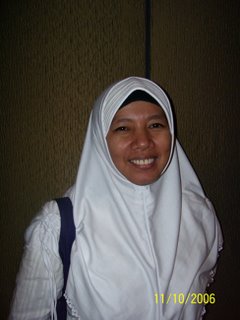 First published in The
First published in The MARIAM ALIMI: FIGHTING FOR AFGHAN WOMEN
Alpha Amirrachman, Contributor,
Mariam Alimi was only a two-year-old toddler when she and all members of her family secretly tried to escape from war-torn
However, stories passed down by her parents and siblings told of many tragic events in a country torn by continuous foreign occupations and civil wars.
The occupation by the
"But both forces brought nothing but desperation to many Afghans," Alimi told The Jakarta Post during a recent study tour organized by the International Center of Islam and Pluralism in Cirebon, West Java.
She added that one of her uncles was forced to become a child soldier to fight against the Soviet forces with the Mujahideen.
"Many youngsters were recruited, often against their will, for the war effort," said Alimi, who was born on Jan. 15, 1982, in
Her father, a sound engineer whose career and dreams in the film industry were shattered by the war, decided that he and all members of his family had to escape their beloved country if they really wished their children to grow up free from fear.
As war ravaged the country, she said education was simply not available at the time.
They escaped, therefore, to
Paying a large amount of money to some people who helped them escape, the family was hidden among a pile of goods for trade in a truck.
"We would have been killed or raped if Soviet soldiers had found us," said Alimi, recalling what her mother told her about the painful and scary journey to freedom.
Approximately three million Afghan refugees settled in
After a year in
Following years of struggle, her family managed to buy a pizza restaurant in
But Alimi cries at what has taken place in her home country.
"The Taliban, who came to power in 1996, was initially welcomed by many Afghans as they promised stability," she said, "but they eventually applied strict sharia law and as a result many people, including my cousins, were barred from going to school or getting jobs."
The Taliban imposed the law ruthlessly, including the stoning to death and severing of hands for what they considered religious violations.
"Soccer stadiums became a venue for executions, usually watched by cheering spectators," she said of a harrowing experience her cousins shared with her.
Besides being barred from school and work, women were obliged to wear the burka, which covers them fully from head to foot.
Radio and television were considered haram (prohibited) and the equipment was destroyed, she added.
By the fall of 1998 the Taliban had taken over about 90 percent of the country and, with its human rights violations and scorched-earth policies, had transformed itself into an international pariah.
What has occurred in her country has bolstered Alimi's sense of humanity. "I thought that I had to do something so what has happened in my homeland would not be repeated elsewhere," she said.
"I was a school teacher in biology, but after further thought I made a switch to international relations."
She took a Masters degree in that subject at
It was written against the backdrop of the war on terror led by the
Her thesis also reveals how women suffered greatly from what she perceived as narrow-minded Taliban policies and the terror network it established.
During her period of study, Alimi worked as an intern with the United Nations in
She has also traveled extensively to many countries, both developed and developing, to carry out comparative studies.
Determined that her sense of humanity needs to be translated into concrete work, Alimi joined the Academy for Educational Development (AED), a 45-year-old, Washington-based non-governmental organization (NGO) that has served in more than 150 countries around the world.
She is now with the Center for Civil Society and Governance of the AED, which focuses on three areas: human rights advocacy, peace-building programs and NGO capacity-building.
Alimi has been involved in a number of projects. Under the umbrella of human rights advocacy, she became involved in the India-based Sari Equity Project; it focused on women's empowerment in
Also, the Bangladesh Human Rights Advocacy Program, which aimed to strengthen human rights and the improvement of women's living conditions through the involvement of thousands of imams (Islamic religious leaders) in
Under the peace-building program, Alimi got involved in conflict resolution in African countries, which was aimed at bringing peace to tribes in conflict, empowering religious leaders and fighting against human trafficking.
She said that
"The
She was referring to the seven imams from
Asked about what she thinks about the democratic atmosphere that she experienced during her stay in the
Asked what she thinks about the current situation in her home country and what she would do to contribute to helping improve conditions there, she said: "I'm relieved that the situation is getting better after the
"I look forward to working on a humanitarian program there to empower fellow Afghan women who have suffered from Taliban bigotry; to help them escape from poverty and backwardness, give them access to education and let them stand on their own feet," Alimi said.
She also added that many from the Afghan diaspora have gone back to




